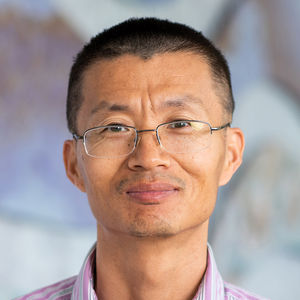
Chuanhe Yu, PhD
Currently, Chuanhe Yu is an Assistant Professor at the Hormel Institute, University of Minnesota. His research interests are genome instability and epigenetic regulation mechanisms. Dr. Yu received his undergraduate and master’s degree from Sun Yat-Sen University in China.
During his Ph.D. training at Iowa State University, he found that transposable elements can induce chromosome breakage and major chromosome rearrangements via alternative transposition mechanisms in maize.
After his graduate studies, Dr. Yu joined the National Cancer Institute at Frederick, Maryland, to study the mating-type switch mechanism in fission yeast.
In 2012, Dr. Yu started his postdoctoral training in the field of epigenomics at Mayo Clinic. He developed a new technique we named eSPAN, which enables the analysis of selective binding of proteins to leading and lagging strands of replicating DNA.
Currently, he is investigating the fundamental mechanisms of epigenetic inheritance in budding yeast, including how parental histones are transferred to new DNA and how histone marks are transferred to the daughter cells.
Education
- PhD: Genetics, Iowa State University, Ames, Iowa, 2004–2009
- MS: Biochemistry and Molecular Biology, Sun Yat-Sen University, Guangzhou, China, 2000–2003
- BS: Microbiology, Sun Yat-Sen University, Guangzhou, China, 1996–2000
Research Interests
I am interested in DNA replication-coupled epigenetic inheritance. One of the major unanswered questions in the field of epigenetic inheritance is how parental histones are transferred onto replicating DNA. Parental histone (H3-H4)2 tetramers have been proposed to randomly segregate between leading and lagging strands of DNA replication forks.
However, we found that the parental histone (H3-H4)2 tetramers consistently enriched at lagging strands of DNA replication in budding yeast. Intriguingly, in cells depleted of Dpb3 and Dpb4, which are non-catalytic subunits of the leading strand DNA polymerase, Pol ε, the bias of parental nucleosome segregation to the lagging strand was markedly enhanced. Pol ε thus appears to mediate the recruitment of parental nucleosomes to the leading strand.
We also discovered that parental H3-H4 tetramers bind to MCM helicase subunit (Mcm2) and are then transferred to the lagging strand by the Mcm2-Ctf4-Pol α complex for nucleosome assembly. While the mitotic cell cycle was not much affected by the asymmetric nucleosome partitioning, we found that mating-type gene silencing was significantly disturbed in the Dpb3/Dpb4 and Mcm2 mutant budding yeast cells.
These studies thus suggest that parental nucleosome segregation is determined by a balance of replisome-intrinsic histone chaperone activities. Modulation of individual histone chaperone activities at the fork may therefore provide a potential mechanism for the asymmetric distribution of epigenetic marks to determine cell fate in development. Now we are exploring other chromatin factors that regulate the epigenetic inheritance process.
Primary Research Areas
- Epigenetics
- Genomics
- Genome stability
Awards
- Mayo-Kendall Postdoctoral Fellowship in Biochemistry, Mayo Clinic, USA (2015-2017)
- D. Honored with Research Excellence, Iowa State University, USA (2009)
